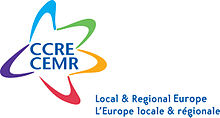Council of European Municipalities and Regions
A major contributor to this article appears to have a close connection with its subject. (May 2014) |
 CEMR logo | |
| Formation | 1951 |
|---|---|
| Type | Association |
| Location |
|
| Membership | 150,000 |
President | Iñigo Joaquín de la Serna Hernáiz |
| Staff | 30 |
| Website | www |
The Council of European Municipalities and Regions (CEMR) is the largest organisation of local and regional governments in Europe. Its members are 55 national associations of towns, municipalities and regions from 41 countries that are part of the Council of Europe. Together these associations represent about 150,000 local and regional authorities.
At the head of its political structure is its president, currently the mayor of Santander, Iñigo de la Serna. It has a staff of about 30, headed by its secretary-general, Frédéric Vallier.
CEMR’s annual budget is about €2.5 million. Membership fees from its national associations make up the bulk of its funding. About 15% are paid by the European Commission through an annual grant.
The organisation has also assumed the function of the European section of the new worldwide organisation United Cities and Local Governments.
History

CEMR was founded in Geneva on 28 January 1951 by a group of European mayors as Council of European Municipalities (CEM). Regions were later allowed to join as well, hence the later name Council of European Municipalities and Regions.
CEMR Presidency
Iñigo de la Serna, Mayor of Santander, has been elected President of CEMR in December 2015.
He is notably succeeding to :
- Annemarie Jorritsma, former Mayor of Almere, CEMR President from 2013 to 2015
- Wolfgang Schuster, former Mayor of Stuttgart, CEMR President from 2010 to 2013
- Michael Häupl, Mayor of Vienna, CEMR President from 2004 to 2010.
- Valéry Giscard d'Estaing, CEMR President from 1997 to 2004
Activities
CEMR's task is to promote a united Europe, based on locally and regionally autonomous government and democracy. To this end, it endeavours to shape the future of Europe by enhancing local and regional contributions, to influence European law and policy, to exchange experience at the local and regional levels and to cooperate with partners in other parts of the world. European legislation has an impact on more than 60% of the policies implemented by cities, municipalities and regions. CEMR works together with its members to ensure that their interests are taken into account when European policy is being drafted.
CEMR is active in a number of political fields, including regional policy, transport, the environment, equal opportunities and governance. Its committees and working groups seek to influence draft EU legislation in order that the interests and concerns of local and regional authorities are taken into account from the earliest stages of the EU legislative process.
Fields of activity
CEMR’s work focuses on five thematic areas, which affect all aspects of the lives of European citizens as well as the local and regional authorities that represent them:
- Democracy, citizenship and enlargement
- Resource efficiency and environment
- Partnership, cooperation and world affairs
- Economic, social and territorial cohesion
- Local and regional governments as employers and service providers
CEMR is also deeply involved in building an extensive European town twinning network. Today, there are over 30,000 twinning projects linking towns from all over Europe. This process is improved through CEMR's close cooperation with the DG Education and Culture of the European Commission.
Last but not least, CEMR is behind several political documents of significance to local and regional governance, such as the Charter of Local Liberties (adopted in 1953), which inspired the Charter on Local Self-Government of the Council of Europe, adopted in 1985. It also launched the European Charter for Equality of Women and Men in Local Life, which was adopted in 2006 and has been signed by more than 1 300 local and regional governments in Europe.
Gender equality : The European charter for equality of women and men in local life
In May 2006 CEMR launched the European charter for equality of women and men in local life. Local and regional governments are invited to sign the charter to make a formal public commitment to the principle of equality between men and women and to implement the charter within their territory.
The Charter is now available in 27 languages and was signed by more than 1300 municipalities from 31 European countries.
In order to monitor the implementation of the Charter by signatories, CEMR, in partnership with the Swedish government and the Swedish Association of Local Authorities and Regions, launched an Observatory of the European Charter for equality of women and men in Local Life in March 2012.
CEMR and town twinning
According to CEMR town twinning has always been a vital way to bring Europe closer to its citizens beyond national boundaries.
In May 2007, CEMR organised a conference on Twinning for tomorrow's world in Rhodes. Over 600 representatives of local governments from across Europe met to discuss issues like new types of twinning; obtaining financial support; and how twinning can contribute to social inclusion. In September 2011, CEMR is organising in Rybnik (Poland) a European congress on citizenship and twinning. It will provide participants with the possibility to discover the next generation of partnerships between local and regional governments and their citizens; explore how to foster the development of a more “grassroots democracy” and to participate in a consultation on citizenship.
See also
- Congress of the Council of Europe
- European Union Regional policy
- List of micro-regional organizations
External links
- Council of European Municipalities and Regions (CEMR)
- United Cities and Local Governments (UCLG)
- Local Government in Europe
- The Archives of the Council of European Municipalities and Regions are consultable at the Historical Archives of the European Union in Florence
- European elections: local and regional governments' manifesto
